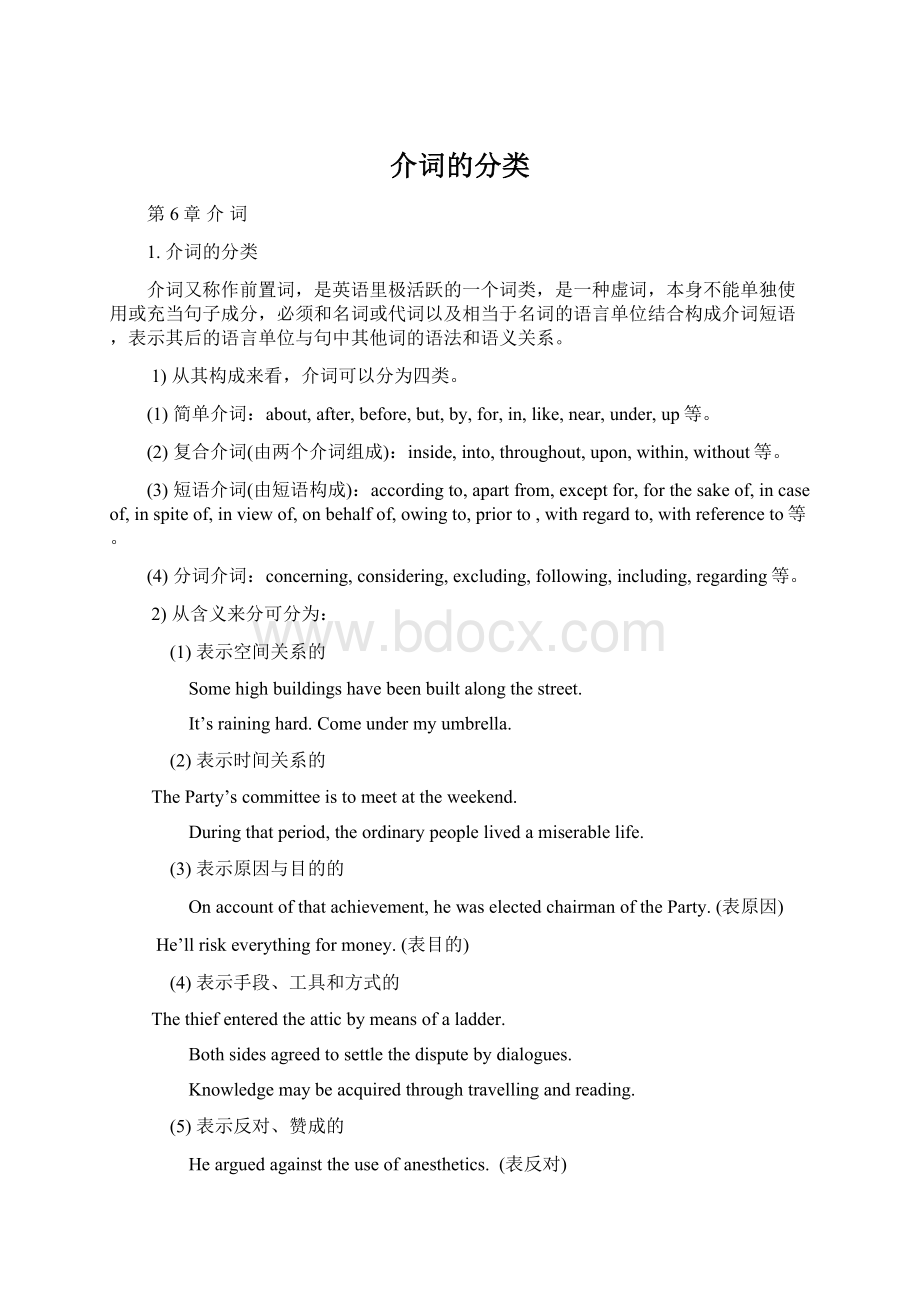介词的分类.docx
《介词的分类.docx》由会员分享,可在线阅读,更多相关《介词的分类.docx(12页珍藏版)》请在冰豆网上搜索。

介词的分类
第6章介词
1.介词的分类
介词又称作前置词,是英语里极活跃的一个词类,是一种虚词,本身不能单独使用或充当句子成分,必须和名词或代词以及相当于名词的语言单位结合构成介词短语,表示其后的语言单位与句中其他词的语法和语义关系。
1)从其构成来看,介词可以分为四类。
(1)简单介词:
about,after,before,but,by,for,in,like,near,under,up等。
(2)复合介词(由两个介词组成):
inside,into,throughout,upon,within,without等。
(3)短语介词(由短语构成):
accordingto,apartfrom,exceptfor,forthesakeof,incaseof,inspiteof,inviewof,onbehalfof,owingto,priorto,withregardto,withreferenceto等。
(4)分词介词:
concerning,considering,excluding,following,including,regarding等。
2)从含义来分可分为:
(1)表示空间关系的
Somehighbuildingshavebeenbuiltalongthestreet.
It’sraininghard.Comeundermyumbrella.
(2)表示时间关系的
TheParty’scommitteeistomeetattheweekend.
Duringthatperiod,theordinarypeoplelivedamiserablelife.
(3)表示原因与目的的
Onaccountofthatachievement,hewaselectedchairmanoftheParty.(表原因)
He’llriskeverythingformoney.(表目的)
(4)表示手段、工具和方式的
Thethiefenteredtheatticbymeansofaladder.
Bothsidesagreedtosettlethedisputebydialogues.
Knowledgemaybeacquiredthroughtravellingandreading.
(5)表示反对、赞成的
Hearguedagainsttheuseofanesthetics.(表反对)
Doyouagreewithhisanalysisofthesituation?
(表赞成)
(6)表示其他含义的
Jack,togetherwithseveralofhisfriends,wasdrinkingatapub.(表伴随)
Despitethebadweather,wehadaball.(表让步)
Watchesmadeintheirfactoryaresuperiorinqualitytothoseproducedinyours.(表比较)
YoucantaketheactionaccordingtowhatItoldyou.(表根据)
Consideringhisreluctance,wewillhavetoturntoothers.(表条件)
Wineismadefromgrapes.(表成分)
2.介词短语的句法作用
介词短语在句子中可作状语、表语、定语、补语等成分。
1)作状语
Hisheartbeatcrazilyforamoment,thenbecamenormalagain.
Becauseofthefavorableweatherorangesgrowquitewellhere.
2)作表语
What’sthearticleabout?
Thisquestionisunderdiscussion.
3)作定语(通常后置)
Hereisachequefor$1000000.
It’sunnecessarytohaveadisputeaboutwheretogo.
4)作宾语或主语的补语
Theyfoundthemselvesinadarkwood.(作宾语补语)
Thisbookisfoundofgreatvaluetobeginners.(作主语补语)
5)作主语、宾语
FromXi’antoBeijingismorethan10hoursbytrain.(作主语)
I’llgiveyouuntiltomorrow.我给你期限到明天。
(作宾语)
3.介词与其他词类的搭配
介词与形容词、动词、名词之间有着广泛的搭配关系。
掌握介词的主要内容就是掌握介词与这些词类的搭配习惯。
因为这些词类很多,这里只能举例说明用法,真正的掌握要靠日积月累。
1)介词与形容词的搭配
independentof独立的ignorantof不知道的tiredof厌倦的afraidof害怕
sickof厌恶的shortof短缺indifferentto冷漠的devotedto专心于
addictedto沉迷于partialto偏爱superiorto优于equalto与…平等
注:
同一个形容词与不同的介词搭配可表示不同的意义。
例如:
(be)angrywith对某人生气(be)angryatabout因某事生气
(be)familiarwith对…熟悉(be)familiarto为…所熟悉
(be)goodat善于(be)goodfor对…有益(be)goodto对…友好
2)介词与动词的搭配
(1)动词+介词:
Eatingtoomuchoftenresultsinsickness.
(2)动词+宾语+介词:
Theysubstitutedpaper-moneyforgold.
上述搭配中的宾语可按语义意图加以改变。
但在词组动词结构中的名词不能随意改变。
例如:
Youshouldmakegooduseofthisopportunity,foritmaynotoccuragain.
(3)动词+副词小品词+介词:
Idon’twishtobreakinonyourthoughts.
3)介词与名词的搭配
(1)某些名词之后要求用某些介词:
Thedependenceonhisdaughtermadehimupset.
(2)某些名词之前要求用某些介词:
HewillleaveforShanghaionbusinessnextweek.(出差)
4.介词兼作副词与连词
(1)绝大部分简单介词可兼作副词,或称“小品副词”。
介词和小品副词的主要区别是:
介词必须和名词等一起在句中起作用,而小品副词通常和动词连用,有时也可单独或被其他副词修饰在句中充当成分。
试比较:
Sheclimbedoverthewall.(介词)/Canyouclimbovertoo?
(副词)
Peterisbehindus.(介词)/Peterisfarbehind.(副词)
Imethimbeforethewar.(介词)/We’vemetbefore.(副词)
Mymotherisinthehouse.(介词)/Isthereanybodyin?
(副词)
(2)少数介词可以兼作连词,如after,before,since,till,until等。
例如:
Theballgoesupveryhighafterithitstheground.
Itwillnotbelongbeforetheycomeback.
5.几组近义介词的比较
1)表示时间的介词
(1)at,on,in
at表示“时间的一点”或“较短暂的时间”,如(时刻)几点几分、黎明、中午、日出、日落等。
例如:
Theyarrivedhomeat10p.m.
Atwhattimewillyouhaveaninterviewthisafternoon?
on表示“日期”,“每星期的各天”,“特定的早晚、日间、上下午”等。
例如:
HewasbornonJune10th,1970.
OnFridayshewillflytoTokyo.
Onthemorningafterhisarrivalhewenttovisither.
WehungoursocksinfrontofthefireplaceonChristmasEve.
in表示“较长的一段时间”,意为“在…的时候”,常表示世纪、朝代、时代、年、季节、月、及一般(非特定)的上下午、晚间或“…时间以后”等。
例如:
TheycametoAustraliainthe1960s.
TheseeventsrecordedhappenedintheMiddleAges.
Technologyofcomputershasdevelopedveryrapidlyin21stcentury.
AsportsmeetwillbeheldinMarch.
Sheusuallygoesshoppinginthemorning.
Manychildrenchoosetogototheseasideinthesummervacation.
Youshouldbeinchargeofthecaseinmyabsence.
Thedinnerwillbereadyin15minutes.
(2)for,since,by,
for表示“某一动作持续的时间长度”。
例如:
IstayedinLondonfortwodaysonmywaytoNewYork.
Wehaven’tseeneachotherforalongtime.
since表示“从某具体时间开始,一直持续到(说话)的时刻”。
常作完成时态谓语的时间状语。
例如:
Ihavebeenwaitingheresincethismorning.
Hehasworkedheresince1990.
by表示“到…的时候”。
动作动词常用完成时态;状态动词(如be)常用一般时态。
比较:
Wewillhavefinishedthereportbynineo’clockintheevening.
Bynoon,everybodywillbeinthisroomforabreak.
(3)till,until
这一对介词意思一样,在肯定句中意思为“直到…的时候”。
例如:
Hewaitedtill(until)8o’clock.
在否定句中意思为“直到…才”。
例如:
UntilnowIknownothingaboutit.
Jackdidn’tarriveattheairportuntilabout12o’clock.
2)表示地点、位置的介词
(1)at,in,
at表示在一点上,或笼统地指一个地方,即把某个地方作为一个点来看待。
例如:
Thecarpulleduprightatthegate.
ShelivesatNo.70HazelAvenue.
in表示大地方,在某物、某范围内,或泛指较具体的位置。
例如:
Soontheywillarriveinthecitytheyhavelongedforalongtime.
Thereissomewineleftinthebottle.
(2)on,over,above
on指“在…平面上”,表示与某物有接触。
例如:
ThereisacolorTVsetonthedesk.
Thechildrenareseatedonthegrass.
over指“在…上方”,表示不与表面接触的垂直的悬空位置,意为“高于…正上方”。
例如:
Theplaneisflyingoverthevillage.
Thereisalampoverthetable.
above指“在…上方”,表示不与表面接触且不垂直的上方。
例如:
Thewatercameaboveourknees.
Theplaneisflyingabovetheclouds.
(3)between,among,amid(st)
between表示“在…两者之间”。
例如:
Mysisterwassittingbetweenmymotherandme.
Canyoushowmethedifferencebetweenthetwowords?
有时between也可指三个以上的人或物。
这时,它表示讲话者分别看待某件东西周围的物体并强调“相互”关系。
例如:
Itwasatreatybetweenfournations.这是一个四国之间的条约。
Therewasaracebetweenthefiveships.这五艘船之间进行了一场比赛。
SwitzerlandliesbetweenItaly,France,AustriaandGermany.瑞士位于意大利、法国、奥地利和德国之间。
among表示“在…两者以上不确指的人或物之间”。
例如:
Thefilmstarstoodamongmanyreporters.
Thepresentsweredistributedamongthestudents.
Theyvisitedthefamoustempleamongthehills.
amid(st)表示“在…之间”(含有被不同之物包围之意),可接复数名词或不可数名词。
例如:
Thespeakermountedtherostrumamidwarmapplause.
Thesoldierschargedforwardamid(st)theenemybullets.
Amidalltherushandconfusionsheforgottosaygoodbye.
3)表示空间运动的介词
across,through
across表示在一个平面上横穿过,意为“从一边到另一边”;也可强调“横过”,或“在…的另一边”。
例如:
Theoldmanwentacrosstheroadtogreethisfriend.
WeshallsoonbeacrosstheChannel.
Thereisamagnificentbridgeacrosstheriver.
Thepopularmusicgroupwillgiveperformanceacrossthecountry.
through表示从某物内部或三维空间中穿过,从一头到另一头。
例如:
Theburglargotinthroughthewindow.
Thedoctorpushedhiswaythroughthecrowdtogettotheinjuredman.
Hewasrunningthroughthestreets.
4)表示工具、方法、手段的介词
with,by,through
with表示所使用的具体工具或手段,也可引出抽象的行为者(如情感、状态等),还可以表示材料。
例如:
Woodisoftencutwithasaw.
Weshouldfacethedilemmawithgreatcourage.
Theroadispavedwithstone.
by表示相对笼统、抽象的途径或手段,意为“凭,靠,以”。
例如:
Babieslearntospeakbyimitation.
Wecanimproveourreadingabilitybyreadingalot.
Byworkinghardhegainedrapidpromotion.
注意在下列表达中,表示途径,方式的介词by其后名词不带冠词。
ThoseTurkishblanketsareallmadebyhand.
Thesecretarytoldusthenewsbytelephone.
Mydaughtergoestoschoolbybus.
through也表示途径,手段。
与by的意义较接近,常与by换用。
例如:
Thebookwassenttoherthrough/bypost.
Hegainedsuccessthrough/bypainstakingefforts.
5)表示“除了…以外”的介词
besides,except,exceptfor,but,apartfrom
besides表示“除…以外”,意为将其包括在内,相当于inadditionto。
例如:
BesidesEnglish,theyalsostudiedmath,physicsandchemistryinthemiddleschool.
Besidesexercisesonthetextbook,youhavetodomore.
except指“除…外,(其余)都…”,表示没有将其包括在内。
常与“all,every,no,none,nothing”等含有整体肯定或否定意义的词连用。
与except连用的整体词和except所跟的词常常是同类的。
例如:
Heansweredallthequestionsexceptthelastone.
Iunderstandeverythingexceptwhyshekilledherhusband.
WegotoworkeverydayexceptSunday.
Iwentnowhereexcepttothelibrary.
Exceptfor也表示“除…之外”,但是和except不同的是,与exceptfor连用的整体词与exceptfor所跟的词往往不是同类的,是指整体中除去一个细节。
例如:
Yourcompositionisgoodexceptforafewspellingmistakes.
Exceptforanoldlady,thebuswasempty.
but表示“除…以外,(其余都或都不)”, 和except的用法相同并常互换。
例如:
Thereisnooneherebut/exceptme.
Hesaidhewouldspendhisholidayanywherebut/exceptinLondon.
Lastnight,Ididnothingbut/exceptwatchTV.
Theenemyhadnochoicebut/excepttosurrender.
apartfrom表示“除…以外”。
根据上、下文的不同,它既可用作besides,也可用作except和exceptfor例如:
Apartfromthem,Ihadnoonetotalkto.(=except)
Apartfromotherconsiderations,timeisalsoafactor.(=besides)
Itisapieceofgoodworkapartfromafewslightfaults.(=exceptfor)
6.介词的用法
1).和动词的固定搭配
adviseagainstdoingsthlaughat/aboutsb./sth.
agreeaboutsth.listentosb./sth.
agreetoaproposallookaftersb./sth.
agreewithsb.lookatsb./sth.
aimat/foratargetlookforsb./sth.
apologizetosb.forsth.meetwithsb.
applytosb.forsth.objecttosb./sth.
approveofsb./sth.payforsb./sth.
arriveat/inquarrelwithsb.aboutsth.
askforsb./sth.readaboutsth.
beginwithsth.reasonwithsb.
believeinsb./sth.refertosb./sth.
belongtosb/sth.relyonsb./sth
borrowfromsb.replytosb.
choosebetweenreportonsb/sthtosb.
confesstosb./tosthresignfromajob
dealwithsb./aproblemretirefromone’sjob
dependonsb./sth